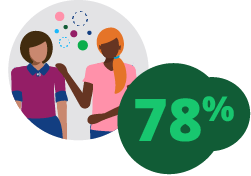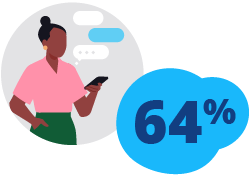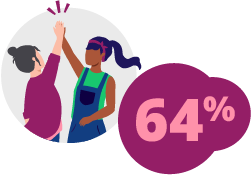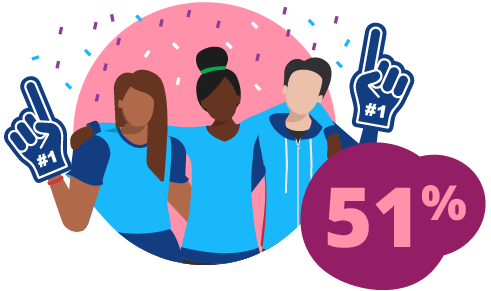Human Connection: The Crucial Secret to Thriving in the Digital Age

May 24, 2024 | 5 min read
To the average observer one could conclude that the world of work is becoming less connected. Between hybrid and remote work environments and the rise of AI alone, it would be easy to assume that at the very least we are moving away from a state of connection. As fewer interactions are happening face-to-face and an increasing number of people have chatbots managing the logistics of their lives, it wouldn’t be outlandish to surmise that the emphasis we once put on feeling connection, even friendship, with the people we work with would be decreasing.
Wiley Workplace Intelligence was curious: In the rapidly changing, increasingly technological world of work, are people feeling connected to their coworkers? Do people strive for connection and what does it mean to them and their mental health? And, finally, what impact does their level of connectedness have on retention?
We surveyed 2008 people, from individual contributors to executive leadership, to understand more about connection in the digital age, and our findings provide interesting insight into the impacts of human connection at work.
People Feel Connected Despite Digital Divide
Our first major insight was that people do feel a sense of connection at work with 78% of respondents saying that they feel connected with their coworkers. This suggests that, despite the rise of technology, human connection remains a vital aspect of the workplace experience. That while technology facilitates communication and collaboration, it cannot fully replace the interpersonal relationships and sense of camaraderie that develop through human interactions.
State of Connection at Work

78%
Feel connected with their coworkers

73%
Enjoy team-building activities

64%
Enjoy connecting out of the office

64%
Have at least one close friend at work
In addition to the significant percentage of respondents who say they feel connected with their coworkers, 69% of those surveyed said that not only do they feel connected, but they also enjoy making connections with their colleagues.
Despite relying on digital tools for communication and collaboration, people still value and prioritize personal connection. Not only is connection imperative to achieving organizational results through the transformative power of teamwork, but there are also social benefits such as sharing experiences, supporting one another, and celebrating achievements. The social element of connection fosters a sense of belonging and that transcends technological barriers, even for teams that are working hybrid or remotely.
Moreover, effective teams need to build a foundation of trust, empathy, and understanding, which are best cultivated through interpersonal interactions even if experienced via technology. While technology enables remote work and virtual collaboration, it's the human element that ultimately strengthens bonds and enhances teamwork.
Friendships at Work Impact Retention
As we have established, connection is an important part of teamwork and productivity, but what about the impact of having friendships at work? Beyond the transactional pleasantries that go into a workday, building true friendships in the workplace can influence everything from wellbeing and mental health to retention.
59% of our survey respondents said that not having friends at work was a factor in deciding to stay at a company. The benefits of building friendships at work are numerous – increased support for one. When you have meaningful connections, you have a greater support network to cope with the inevitable stressors of our work lives.

59% of respondents said not having friends at work was a factor in deciding to stay at a company.
Connection in the Workplace Improves Mental Health
It is also important to note the impact that friendships at work can have on one’s mental health. True friendships in the workplace contribute to improved mental health as they can act as support networks during challenging times, provide a sense of belonging, and alleviate stress through shared experiences and understanding. We have all worked on that one project that turned out to be way harder than we thought it would be – how nice is it to process the experience with a friend over lunch or a quick phone call?
Additionally, having friends at work can increase job satisfaction, as positive social interactions contribute to good organizational cultures and enhance overall workplace enjoyment.
Foster Connection in Your Organization
It can be difficult to know where to start improving connection at work, especially in hybrid or remote environments. In the “old” days, it was easy to order a few pizzas and gather everyone in a conference room for some ice breakers, but how does that translate to the digital age?
While that kind of “forced socialization” can be a groan-inducing part of work life, depending on how it is executed, half of our respondents reported that they actually want to learn more about their coworkers by doing a team-building activity.

51% want to learn more about coworkers by doing team-building activities.
While the traditional pizza-in-the-conference-room scenario may look different now, there are still ways to nurture connection, and the foundation of real friendships, in the workplace by investing in team-building activities that build trust.
For example, team volunteering events or group lunches are a great way to connect during business hours, but that only works if you are in the same location. For remote teams who may need to invest more intentional time and effort to build rapport, facilitated learning experiences like Everything DiSC® and The Five Behaviors® provide meaningful opportunities for coworkers to learn more about themselves and others – building trust, commitment, and cohesion in the process.
Taking the time to nurture the bonds that are created through common experience will always be a good return on investment. Whether it is making time for team chats or personal stories during virtual meetings, offsite lunches, or facilitated learning experiences, fostering connection at work will pay dividends in improved mental health, retention, and, ultimately, the bottom line.
